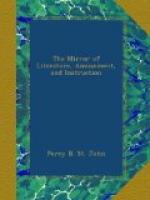In relation to this awful calamity we add the following remarks:—Heaven be praised (says Mr. Malcolm[6]) old London was burnt. Good reader, turn to the ancient prints, in order to see what it has been; observe those hovels convulsed; imagine the chambers within them, and wonder why the plague, the leprosy, and the sweating-sickness raged. Turn then to the prints illustrative of our present dwellings, and be happy. The misery of 1665 must have operated on the minds of the legislature and the citizens, when they rebuilt and inhabited their houses. The former enacted many salutary clauses for the preservation of health, and would have done more, had not the public rejected that which was for their benefit; those who preferred high habitations and narrow dark streets had them. It is only to be lamented that we are compelled to suffer for their folly. These errors are now frequently partially removed by the exertion of the Corporation of London; but a complete reformation is impossible. It is to the improved dwellings composed of brick, the wainscot or papered walls, the high ceilings, the boarded floors, and large windows, and cleanliness, that we are indebted for the general preservation of health since 1666. From that auspicious year the very existence of the natives of London improved; their bodies moved in a large space of pure air; and, finding every thing clean and new around them, they determined to keep them so. Previously-unknown luxuries and improvements in furniture were suggested; and a man of moderate fortune saw his house vie with, nay, superior to, the old palaces of his governors. When he paced his streets, he felt the genial western breeze pass him, rich with the perfumes of the country, instead of the stench described by Erasmus; and looking upward, he beheld the beautiful blue of the air, variegated with fleecy clouds, in place of projecting black beams and plaster, obscured by vapour and smoke.
The streets of London must have been dangerously dark during the winter nights before it was burnt; lanterns with candles were very sparingly scattered, nor was light much better distributed even in the new streets previously to the 18th century. Globular lamps were introduced by Michael Cole, who obtained a patent in July, 1708.
We conclude the illustrations of this day with a singular opinion of the author just quoted. Speaking of the burning of London, he says, “This subject may be allowed to be familiar to me, and I have perhaps had more than common means of judging; and I now declare it to be my full and decided opinion, that London was burnt by government, to annihilate the plague, which was grafted in every crevice of the hateful old houses composing it.”
[5] The progress of the fire
might have been stopped, but for the
foolish
conduct of the Lord Mayor, who refused to give orders
for
pulling down some houses, without the consent of
the
owners.
Buckets and engines were of no use, from the confined
state
of the streets.




